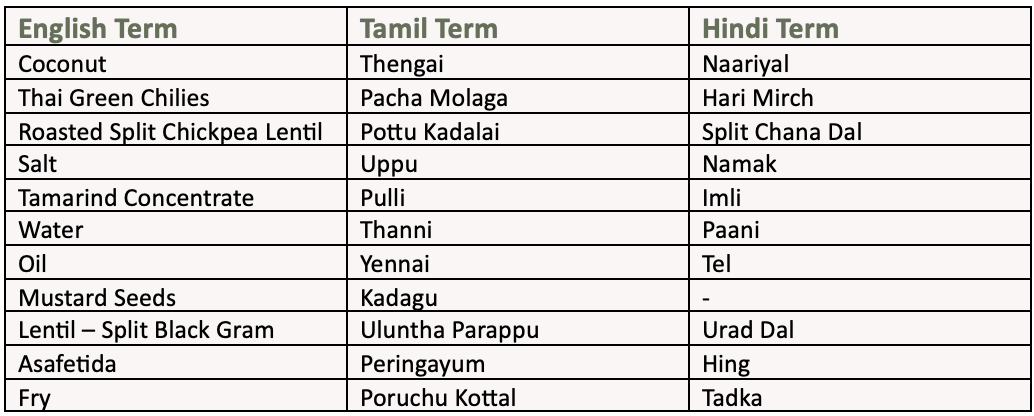Every main South Indian entree needs a sturdy sidekick and that is coconut chutney. Growing up, coconut chutney, along with chutneys in general, have become a the go-to accompaniment to any meal. Its mildly salty, and earthy flavor, contribute towards a world of flavor; allowing each bite to be fully balanced. I am so excited to share this easy and delicious recipe and hope it brings as much life to your meals as it does for myself and my loved ones!
The Origins of Coconut Chutney
Coconut Chutney (Chut-knee) has a long history in the Indian cuisine. Chutney is an almost-smooth, paste-like dish that is used for dipping your entrees into – typically this entree is more carb-heavy such as rice, bread, or dosas. They have been at the front and center in Indian culture since about 500 B.C. Like most Indian-language vocabulary, the word “Chutney” derived from the Sanskrit word, “Chatni”, meaning to lick. Chutney was first introduced to India during the Mughal Era. Mughal emperors had brought a range of new culinary ingrediants from Central Asia and brought with them, the method of grinding dry and wet ingredients into a thicker paste using stones. This foundational journey of chutney has brought about the sweet and savory side dishes we know today.
About the Ingredients
The ingredients in most chutneys are quite simple. Each region in the world makes it differently; some with vinegar, some with oil, etc. Our dish today, is made in the traditional South Indian manner; with water. We will be using our blenders with some dry lentils and shredded coconut to create the perfect marriage between earthy and salty. A great thing about chutneys is you can easily replace things based on allergies. Should you be allergic to say, coconuts, you can always replace with onions or tomoatoes (or both) as easy as pie – Just be sure to sautee those veggies well before blending.
What Can It Be Used With?
Coconut Chutney, and chutneys in general, can be used as a side-dish for various South Indian entrées such as Sambar, Dosa, Idli, Uttapam, etc. Chutney typically is the tertiary element to most South Indian meals – for example, each meal is a combination of a carb-based entrée such as rice or roti, a stew, and a condiment or curry. This creates a multi-layered experience with each bite of your food and lets you travel through a world of flavor.
Disclaimers
- This recipe contains coconuts! Please be aware of any and all allergens.
- This recipe is mild compared to the original – feel free to adjust the chili ratio according to your needs.
References
“Chutney.” Wikipedia, Wikimedia Foundation, 1 Mar. 2024, en.wikipedia.org/wiki/Chutney#:~:text=History,-Learn%20more&text=Similar%20in%20preparation%20and%20usage,contacts%20with%20the%20Indian%20subcontinent.
K, Prameela. “The Chutney Chronicles .” The New Indian Express, www.newindianexpress.com/lifestyle/food/2023/Sep/27/the-chutney-chronicles-2618452.html. Accessed 20 Mar. 2024.
“Role of Chutneys in the Past.” The Times of India, The Times of India, 13 Mar. 2023, timesofindia.indiatimes.com/life-style/food-news/how-did-chutneys-came-to-the-world-history-and-5-most-popular-chutneys/photostory/98609603.cms?picid=98609621.
South Indian Coconut Chutney
Ingredients List
Blender Ingredients
Frying Ingredients
Directions
-
Add the “Blender Ingredients” to a blender/grinder and blend until you get a smooth paste.
-
Once blended to a mostly smooth texture, set aside in a separate bowl.
-
For the added fry (we call this thalaichu kottu in Tamil)
-
- In a frying pan, heat the oil.
- Once hot, add the mustard seeds.
- When the mustard seed begin popping/spitting, add the urad dhal and asafoetida.
- Saute until the urad dhal is a golden brown (this will happen pretty fast).
-
-
Add this mixture to the blended chutney and mix it in.
-
Serve warm, room temp., or cold depending on your preference. Enjoy!
Nutrition Facts
Servings 32
- Amount Per Serving
- Calories 28kcal
- % Daily Value *
- Total Fat 2.6g4%
- Saturated Fat 1.57g8%
- Sodium 13mg1%
- Potassium 1.8mg1%
- Total Carbohydrate 1.1g1%
- Dietary Fiber 0.5g2%
- Sugars 0.4g
- Protein 0.3g1%
- Vitamin D 0.02 IU
* Percent Daily Values are based on a 2,000 calorie diet. Your daily value may be higher or lower depending on your calorie needs.
Note

This chart is a simple keyword translation. Some words may not be filled as I either don't know them or was unable to find them on the internet. In this instance, feel free to provide feedback and I would be happy to update it!



Lovely